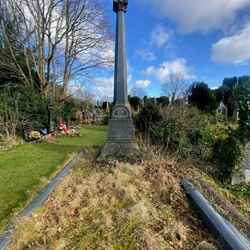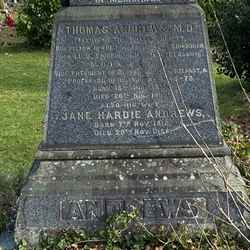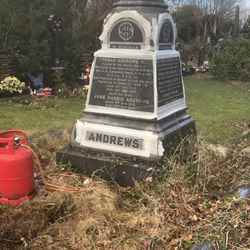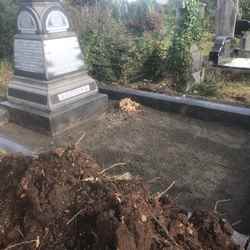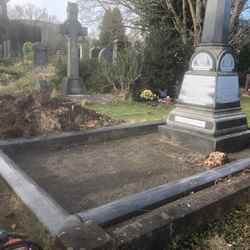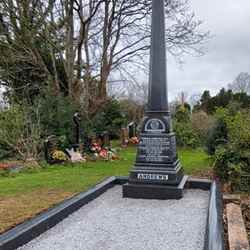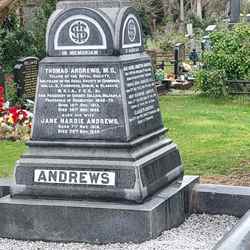Northern Ireland local section's dedication leads to restoration of grave of Belfast science pioneer Thomas Andrews
The grave of Northern Irish scientific visionary Thomas Andrews was yesterday rededicated in a special ceremony after weeks of restoration work in a Belfast cemetery.
Members of the Royal Society of Chemistry’s Northern Ireland section engaged Grave Concern Ireland to restore the resting place of Queen’s University Belfast pioneer Thomas Andrews.
The chemical scientist and physicist died in 1885 at the age of 71 and was buried in Belfast City Cemetery at the end of a life that saw him produce research still relevant today.
Among his most significant findings was the discovery of the ‘critical temperature’ for the liquefaction of carbon dioxide, which is the basis of cryogenics and low-temperature chemistry and physics. The modern refrigerator was also born out of his research on the liquefaction of gases.
As well as restoring the grave and attending the event, members of the RSC’s Northern Ireland section also tracked down two members of the extended Andrews family who live locally.
Robert Andrews is a chemistry teacher at Hazelwood College in Belfast, while Johnny Andrews, a chartered accountant in the city, also hopes news of the celebration will help him to find other descendants of the chemistry great.
“The Northern Ireland Local Section was involved in getting the Chemistry Landmark plaque for Thomas Andrews and it is fitting that now they have helped to restore his grave,” said Dr Dermot Hanna, the secretary of the RSC Northern Ireland local section.
Andrews, who was born and raised in Belfast, took on a number of key roles around the city in the 1830s. In 1835, he became both the professor of chemistry at the Belfast Academical Institution and the attending physician at the Belfast General Hospital. Three years later, he was named medical officer to the Belfast Union Infirmary.
In 1845, he was then appointed the vice-president of the newly established Queen’s University of Belfast, resigning from his teaching position and private practice. He also became the first professor of chemistry at Queen’s and served in both roles until 1879.
As well as establishing himself an authority in scientific circles, he also served as a president of the Belfast Natural History and Philosophical Society, was elected to the Royal Irish Academy, and became a member – and then president – of the Belfast Literary Society.
His work also saw him elected as a fellow of the Royal Society, five years after he received the organisation’s prestigious Royal Medal in 1844.
Andrews has previously been honoured by the RSC, which recognised his contribution to science with a National Chemical Landmark blue plaque at Queen's University Belfast in 2013.
RSC representatives were reacquainted with this the day before the grave rededication when they joined staff from Queen's University's chemistry department and library, who laid on a tour and display of some of its impressive array of Andrews artefacts. These included correspondence with Michael Faraday, early photographs of some of his work and other pieces of history.
The tour and the grave rededication exemplified the impact Andrews had on both Queen's and chemistry history. RSC chief executive Dr Helen Pain gave a short speech paying tribute to Andrews and the hard-working members of the local section who honoured him.
“The impact of Thomas Andrews’ work spans generations and the fact it is still relevant today shows how ahead of his time he was,” she said. “We were proud to recognise his efforts with a National Chemical Landmark plaque in 2013 and we are just as proud today to see his resting place restored to a pristine condition.
“The members of the local section have done a tremendous job in transforming the site and we hope more people are reminded of the contributions of Thomas Andrews as a result of their hard work.”
-
Read more about the grave rededication with this story from BBC Northern Ireland. BBC Newsline also published a short video about the celebration, which you can watch on X/Twitter.
Blue plaque application process
The scheme is currently closed to expressions of interest. This page will be updated when expressions of interest reopen.
For information purposes only at present, you can find out more about the process and scheme criteria below.
- Sites receiving a plaque can be established to mark a person, teams, organisation, collaboration, building, process, discovery, innovation, or a breakthrough
- The nomination should represent work by people in the chemical science community which has led to significant positive impacts for local, regional, national, or global society
- The nomination should celebrate diversity in the chemical sciences
- For UK applications, the site for the plaque must be in the UK or Republic of Ireland and should celebrate or commemorate people or work based in the UK or Republic of Ireland
- The site for the plaque must be in an accessible and publicly visible space
- International applications can be considered when made through a sister society or a Royal Society of Chemistry international local section. Please speak with us before making an international application
When expressions of interest are open:
- Before getting in touch with your proposal, please ensure that you have read our eligibility criteria and application guidance
- Get in touch with the team using the contact details on this page to provide details of your proposal
- A member of the team will get back to you to discuss your suggestion in more detail
Each application will be considered by a broad panel of representatives from across the RSC in areas including inclusion and diversity, research and innovation, prizes and awards, education, engagement, and communications.
The representative group will consider:
- eligibility criteria being met
- visibility of the site for the plaque
- connection to the RSC’s purpose and mission to help the chemical science community make the world a better place
- the nature of the diversity being celebrated
- the nature of the chemistry being celebrated
- the nature of the impact on science and society – this could be local, regional, national or global and across any area including but not limited to health, climate and the environment, wealth and industry, sustainability, wellbeing, education, justice, equality, nutrition and alleviating poverty
- capacity to engage the local and/or wider community with the chemical sciences – engagement ideas provided at the application stage will be taken into account
- resource capacity and timelines to deliver in the context of other chemical landmarks in the pipeline
Please read our application guidance for further information.
Press office
- Tel:
- +44 (0) 20 7440 3351
- Email:
- Send us an email

